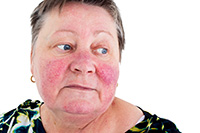 By some estimates, as many as 14 million people in the U.S. are living with rosacea, a skin disorder that affects the face. But as common as it is, how much do you know about it? Here are answers to some frequent questions about this condition.
By some estimates, as many as 14 million people in the U.S. are living with rosacea, a skin disorder that affects the face. But as common as it is, how much do you know about it? Here are answers to some frequent questions about this condition.
Q: What are its symptoms?
A: Rosacea often starts as a redness that looks like a blush across the nose, cheeks, chin or forehead. In time, red pimples and bumps may appear. Small, red blood vessels may become visible under your skin, which might burn or feel warm too.
Rosacea may also irritate and inflame your eyelids and the white part of your eye. And some people may develop a swollen bumpy nose.
Q: What causes rosacea, and who gets it?
A: Exactly what causes rosacea is still unclear. But it can run in families, so there may be a genetic link. And while anyone can get rosacea—including children and people of color—most people who do are fair skinned. Women are slightly more likely than men to have rosacea. But men are at higher risk for a severe case.
Q: Can it be cured?
A: No, but treatment can reduce flare-ups and help your skin look or feel better.
For example, your doctor may suggest antibiotic medicines applied directly to your skin. Enlarged blood vessels on your face can sometimes be removed with laser surgery. And eye treatments might include steroid eye drops. If your nose is bumpy and swollen, you may be able to have extra skin removed.
Q: How else can I help my rosacea get better?
A: Watch for things that make your rosacea worse. Possible culprits include sun exposure, hot drinks, spicy foods, stress, and very hot or cold temperatures. Try to stay away from any triggers that affect you.
To avoid irritating your already sensitive skin, use mild skin care products and gentle cleansing techniques. And always apply a broad-spectrum sunscreen with an SPF of 30 or higher before you head outdoors.
Watson Clinic’s department of Dermatology can help you manage a variety of skin conditions, including rosacea, from five convenient locations. Visit WatsonClinic.com for more details.